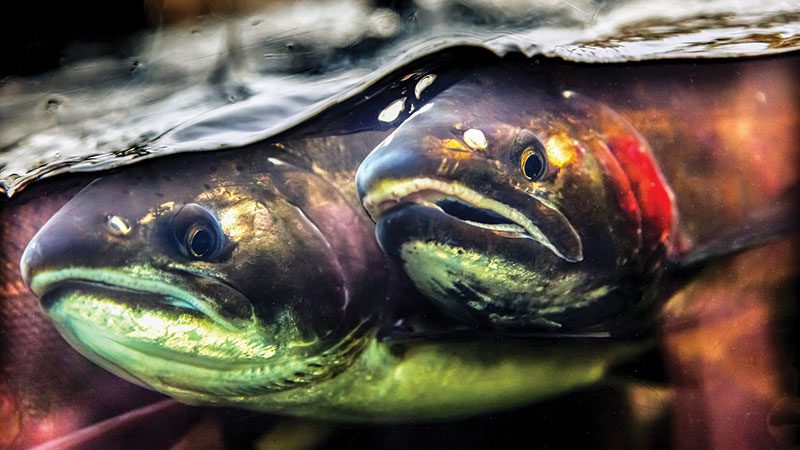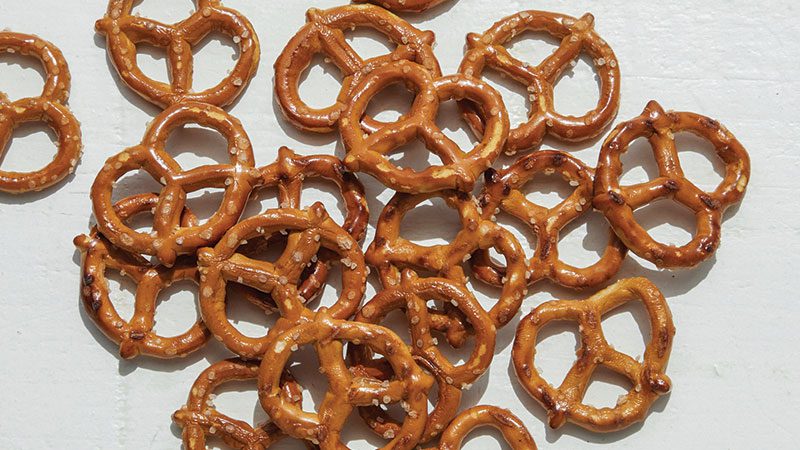News bites
This article was originally published in September 2023

Shading salmon streams
Washington state is putting more money into a low-tech approach to help salmon thrive. State officials are hoping to plant millions of dollars’ worth of trees along rivers and streams to cool the water and protect the fish. Gov. Jay Inslee and Democratic and Republican lawmakers wanted to tackle warming streams this past legislative session as a way to combat some of the effects of global warming. Inslee’s office and the Ecology and Fish and Wildlife departments met with farming groups, business interests, environmental organizations and several tribes to come up with a system to address the problem. (Crosscut.com)
Sweetener guidelines
The World Health Organization (WHO) has released a new guideline on non-sugar sweeteners (NSS), which recommends against the use of NSS to control body weight or reduce the risk of noncommunicable diseases. The recommendation is based on the findings of a systematic review of the available evidence, which suggests that use of NSS does not confer any long-term benefit in reducing body fat in adults or children. Results of the review also suggest that there may be potential undesirable effects from long-term use of NSS, such as an increased risk of type 2 diabetes, cardiovascular diseases and mortality in adults. (who.int)
New apple variety
Washington State University (WSU) apple breeders have come up with a new variety. It’s an offspring of two well-known names, according to WSU horticulturalist Kate Evans. “We took pollen from the flowers of a Pink Lady tree and then we just dusted that pollen on to the flowers of a Honeycrisp,” Evans said. “It’s a more precise way of doing what the bee does.” This offspring is, so far, called WA-64. (Catchier name to come.) (KUOW.org)
Oregon fish and wildlife
Rural perspectives are expected to have more sway on Oregon’s Fish and Wildlife Commission now that its members will represent river basins rather than congressional districts. However, the state’s most populated region will still have an outsized influence on the commission’s policies under a bipartisan bargain struck in the final hours of the 2023 legislative session. After seven previous versions of the legislation failed to pass muster, lawmakers agreed to reduce the dominance of Oregon’s northwest urban corner without depriving it of control of the commission. (CapitalPress.com)
Meat labeling terms
The seal of approval from the U.S. Department of Agriculture on meat and poultry you see at the grocery store may soon carry more weight thanks to an update to labeling guidelines for meat producers that will more rigorously verify how animals were raised. The government agency announced a new multistep effort on Wednesday for the first time since 2019 in which the Food Safety and Inspection Service will raise the bar on its requirements for producers’ claims about how animals were raised. Terms that appear on labels such as “grass-fed” and “free-range,” which are voluntary marketing claims, must now be approved by the Food Safety and Inspection Service before being put on a label. (abcnews.go.com)
Food business incubator
A new business incubator has come to King County’s local food scene. The Food Business Resource Center’s incubator program was created specifically for small food and farm producers using locally grown ingredients to develop and test value-added and packaged food products. Hosted at the 21 Acres sustainable agriculture facility in Woodinville, incubator program participants will receive free access to a commercial production kitchen, alongside business coaching and mentorship. (KingCountyGreen.com)
Organic Trade Association
Tracy Favre, former chair of the U.S. Department of Agriculture’s National Organic Standards Board, has been named president of the Organic Trade Association. Favre is currently vice president of sustainability for live operations at Handsome Brook Farms, LLC, which offers eggs from pasture-raised, cage-free chickens. She has been involved in the organics industry for over 30 years and was on the National Organic Standards Board from 2012-17, ending her tenure as board chair. (FoodBusinessNews.net)
Gluten-free bread research
Sorghum bran, often a low-cost byproduct of sorghum milling, can enhance gluten-free bread’s nutritional value without compromising its flavor, according to a study published in the Journal of Food Science. While gluten-free foods are in demand to meet consumers’ medical needs and dietary preferences, these foods sometimes are deficient in nutrients and lack taste and texture that appeals to consumers. In gluten-free bread, wheat flour is typically replaced with refined flour and starches from other sources. (ars.usda.gov)

Salty snack sales
Salty snacks—pretzels, chips, popcorn and the like—topped the list of best-selling specialty foods last year for the first time, according to the Specialty Food Association (SFA), which hosted (a June) trade show at the Javits Center in Manhattan. A “return to more social events and entertaining is driving sales” of this category, the SFA said in a trends report. Plus, “personal indulgence has proven to be pandemic- and inflation-proof.” (Axios.com)
Cashless retail ban
Retail shops and restaurants in unincorporated King County will be required to accept cash after a divided Metropolitan King County Council voted narrowly for the change this summer. It is, on its face, an odd mandate to come from a government body—You must take this cash!—but it’s one that, supporters argue, has become necessary as more and more businesses choose to accept credit and debit cards only, excluding those who may not have access to a bank account. “For folks who need every dollar to go toward food and essentials, rather than fees, cashless business practices act as a barrier to them accessing those needs,” said Councilmember Jeanne Kohl-Welles, the lead sponsor. (SeattleTimes.com)
Toxic chemicals ban
The Washington Department of Ecology adopted sweeping rules that will prohibit the use of toxic chemicals like PFAS and bisphenols in certain consumer products. The new rules are the culmination of over four years of work through the “Safer Products for Washington” program that started in 2019, when the state Legislature passed a law giving authority to Ecology to identify and regulate toxic chemicals found in common consumer products. Manufacturers, distributors and retailers must comply with the new regulations starting as early as January 1, 2025, for certain restrictions, or face the threat of fines. (SeattleTimes.com)
Food waste research
Two recent studies, from the Cornell University Dyson School of Business and market research firm 210 Analytics, have found that frozen foods can play an important role in lowering food waste rates. A (Cornell) analysis of multiple studies affirmed that, in general, frozen foods are wasted less than their fresh counterparts at both the retail and consumer levels. While the rates of food waste vary among different types of food, among the fruits and vegetables studied, the frozen products are typically much less likely to be thrown out than their fresh counterparts. (ProgressiveGrocer.com)
Export tariffs lifted
After years of campaigning, Senator Maria Cantwell celebrated President Biden’s agreement with the Prime Minister of India to remove tariffs placed on Washington apples, chickpeas and lentils. According to Sen. Cantwell, the tariffs, which were placed in 2019, brought a massive decline in Washington agricultural exports to India. “Today is a very good day for Washington’s world-famous apples and a huge boost to Washington state’s agriculture economy,” Sen. Cantwell said. (Fox13Seattle.com)
Cosmetics chemical ban
The Washington state Legislature has passed some of the country’s strongest legislation to protect residents from hazardous chemicals in cosmetic products. Starting in 2025, the Toxics-Free Cosmetics Act will ban the manufacture, sale and distribution of cosmetics containing nine chemicals and chemical classes, including formaldehyde and “forever chemicals.” The act…puts Washington “at the bleeding edge” of state-level efforts to clean up the cosmetics industry, said Laurie Valeriano, executive director of the nonprofit Toxic-Free Future. (Grist.org)
Seeds lawsuit
The U.S. Environmental Protection Agency’s (EPA) failure to effectively regulate seeds coated with highly toxic pesticides violates federal pesticide laws and is devastating pollinators, wildlife and landscapes across the country, according to environmental groups who filed a lawsuit. “Crucially, there’s mounting evidence from various studies of the harms that are happening directly from the use of neonics on coated seeds,” says Amy van Saun of Center for Food Safety (CFS), one of the lead attorneys on the case. Farmers now plant pesticide-coated seeds on more than 100 million cropland acres across the country; some estimate that 80 to 100% of corn acreage is planted with treated seed. (CivilEats.com)
Popular cherry
The Black Pearl, a Cornell University cherry cultivar crossed over 30 years ago, is becoming more popular in the Northwest as growers work out the kinks of its growing habits. Growers in the region have been actively seeking earlier and later varieties in recent years. The Black Pearl, an early-ripening dark cherry, is advertised as Chelan timing, coming off trees 10 or more days before Bing. Northwest growers have found it harvests roughly at Tieton or Coral Champagne timing—still early, but not as early as originally billed. (GoodFruit.com)
